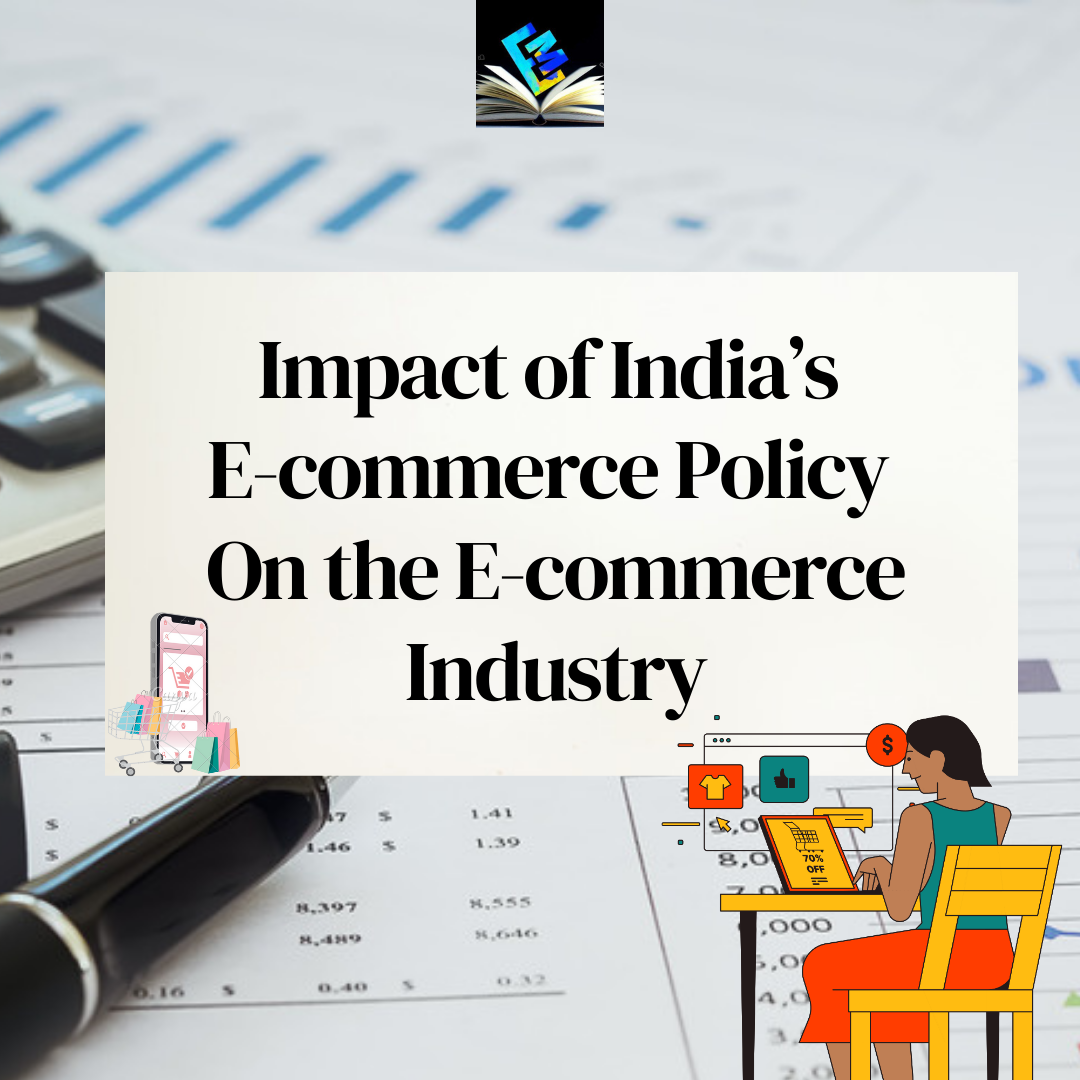
Impact of India’s E-commerce Policy On the E-commerce Industry
keywords – E-commerce policy, Economy, E-commerce, Law & Policy
E-commerce is a trending sector in India. There are many e-commerce companies. Smartphone’s, home appliances, kitchen accessories, dresses, cosmetics, medicines, riding, food, etc. are available in e-commerce. Using the internet and apps, our shopping has become easy and less time-consuming. Still some people may have doubts on the products purchased online, if they are safe and of quality or not. In order to overcome all these fears, government has framed various policies to regulate the e-commerce industry.
What is e-commerce?
E-commerce is buying and selling products through the internet. Flipkart, Amazon, Firstcry, Myntra, etc., are examples for e-commerce companies. There are also many small e-commerce companies which provide services to the people in limited regions. Ordering foods can be done online using apps like Zomato and Swiggy. No need to go to the market, everything can be done using your phone itself. Not only sites, now telegram, facebook and whatsapp are trending in the sale of products.
Merits of E-commerce industries
Ease Purchase
To purchase a dress, you will be going to garments shop. There you may find some collections of Kurtis. Then you will be moving to other shop, there you will find other kind of collections which is more elegant and beautiful than the first shop. Like this the shopping for a dress may take 2 to 3 shops visit.
But online the purchase is done from our home without going to a shop. Just through smart phone or laptop, you can view the product and make an order. You can pay the amount through online or at the time of delivery. In 3 or 4 days the product will be in your hands. Similarly, comparison can be done in online purchase also. There are many sites available for purchase with best price and quality. During Pandemic time, the service of Zomato, Swiggy companies are unforgettable.
One Shop Place
To buy a cooker you have to visit kitchen accessories shop, then to get a dress you have to go to dress shop. For each home items you have to visit each shop. But if you prefer online platforms, all your needs are fulfilled at one website itself.
For example, Flipkart website is enough to buy all the needs for home (from computer to groceries). Most of the people don’t like wandering.
Demerits of E-commerce industries
Since e-commerce industries make our purchase easy, there are some demerits also. In some cases, the products delivered are not in quality. The customer is not satisfied with the product. The product may differ in color, size sometimes. The delivery of the product may take more time.
While buying dresses, you cannot try the product before buying. During the payment of money, if the site gets crash then the payment made will be credited but not acknowledged. The safety of the credit card details provided.
E-commerce Policy
E-commerce business affects sales in small shops. During festival seasons, sales in the shop are reduced due to online shopping. So the vendors of small shops start to raise voice against online shopping. To solve all these conflicts, government drafted the ecommerce policy in 2019.
E-commerce policy 2019
The Ministry of Commerce and Industry released the draft National e-Commerce Policy on 23 February 2019 (DPIIT 2019). The policy drafted was to regulate the online companies. The main aim is to develop the growth of online business without affecting micro, small and medium companies. Online companies should set privacy policies. They should not do any unfair trade. The company name, address and contact information should be provided.
E-commerce policy 2020
In 2020, The e-commerce policy was redrafted and released. Now the government stated to appoint a nodal officer for contact. Return policies for the products within 14 days was acceptable. The product should be displayed with description and customer reviews. The brand name should not force the customer to buy the product. E-commerce sites should not sell their own site named products.
E-commerce Policy 2021
In 2020, once again the Government amended the policy. Now the registration for e-commerce business is mandatory. The e-commerce sites should act as a marketplace to sell third-party products.
Impact of Policy on E-commerce Industry
After the release of these policies, online sites have come under one umbrella. All the sites are unique and following same set of rules. They have privacy policies, contact information in their websites. Now the prices of a product are same in all the sites with small difference from vendors. If you are going to buy a curtain worth Rs.200 in shop, then possibly, online you may get it for Rs.175. All the websites are displaying their products with images, full specification details, warranty, guarantee, delivery details, shipment, and mode of payment. Customer reviews are also provided for the products.
Now most of the sites have accepted for refunding and exchanging. Exchange offers are helpful for customers to replace their old product with new one. Refund and exchange are at free of cost. Third-party seller’s details, address are displayed along with product description. Flash sales have been stopped due to the policies. What is Flash sale? Selling smart phones with limited stock at a discount. Most of us have experienced this sale and got disappointed many times.
Discounts are allowed in sites for a minimum percentage and sellers are not forced for discount. Ads given by e-commerce sites should not allow misleading in price, guarantee, and quality. For each imported product, the sites should display the local alternative product to the customer.
Conclusion
Government framed the policies to bring growth in e-commerce industry. The policy is to create a structured online business without affecting small vendors. These policies don’t affect the e-commerce companies but to regulate them.
Written By – Jaya Ambika
FOR MORE INFO VISIT US!
Or mail us at edumoundofficial@gmail.com
Read Similar Articles – Growing realm of the E-Commerce Industry in India






